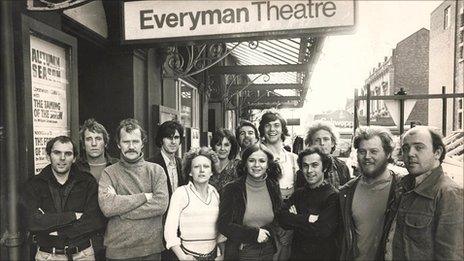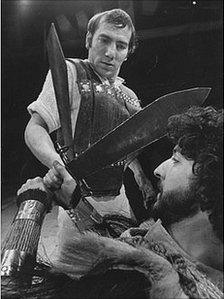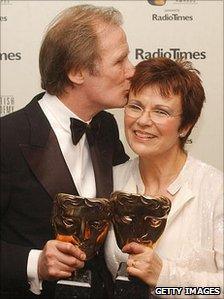Theatre's star-studded class of '74
- Published

The Everyman's company included Julie Walters (front centre), Matthew Kelly (back centre) and Bill Nighy (back, third from right). Photo: Liverpool Daily Post
Pete Postlethwaite, who died last week, was part of a remarkable group of young actors and writers who started their careers at the Liverpool Everyman theatre in the 1970s, alongside Julie Walters, Bill Nighy, Jonathan Pryce and Willy Russell.
In summer 1974, the UK got its first sense that something interesting was happening at a scruffy theatre on Hope Street in Liverpool.
A Beatles musical called John, Paul, George, Ringo... and Bert, written by a 26-year-old playwright called Willy Russell and starring unknown actors Trevor Eve, Bernard Hill, Anthony Sher and Barbara Dickson, had become a big hit.
It was seen by 15,000 people in six weeks before transferring to the West End, where it ran for a year and won a string of awards.

Pete Postlethwaite captivated audiences as Coriolanus
That would have been fairly impressive. But when the show moved to London, most of the Everyman's company moved with it, leaving a big gap back in Liverpool.
A young Jonathan Pryce was charged with assembling a new acting company, and signed up Julie Walters, Bill Nighy, Matthew Kelly and Nicholas le Provost to appear in The Taming of the Shrew that October.
That play would also have featured Pete Postlethwaite as Petruchio. But he had just accepted another job at the Playhouse, the Everyman's city rival.
He came on board for the next production, however, for a period that saw the Everyman act as a springboard for the careers of some of Britain's most popular and acclaimed actors.
The story of the Everyman's class of '74 has come to the fore again, but is tinged with sadness following Postlethwaite's death.
His conviction and charisma made a big impression on his fellow cast members.
"Peter was at the centre of that amazing ensemble in Liverpool in the early 70s," recalls Walters. "I was in a production of Brecht's Coriolanus with him and I have never ever seen anybody act like that.
"It was just absolutely extraordinary. Talk about being enthralled - the audience were completely terrified part of the time.
"I've never seen anything like that before or since. When he came off stage, his mother said to him: 'Oh Peter, you'll go round the bend if you carry on like that.'"
Pryce recalls Postlethwaite as an "enormously likeable, hugely talented, compassionate, political man".
"You couldn't help but like him, and audiences loved him. And he had a great sense of fun about him," he says.
Pryce puts the theatre's golden spell down to its former artistic director Alan Dossor, who was determined to reflect real life in the region and to draw the city's population in.
That included a highly political agenda, with Dossor commissioning plays about local issues and scandals.
"The idea was to tackle the political establishment," Pryce recalls. "There were lots of targets at the time, and it was felt that it was possible to do things at a local level."
Dossor's determination to put real voices on stage was coupled with an attempt to nurture the talent of his performers.

Bill Nighy and Julie Walters won Bafta TV awards in 2004
"People were taken care of," says Pryce, who went on to win two Laurence Olivier Awards in the West End as an actor and a pair of Tony Awards on Broadway.
"It was a family. You look back on it and think, yes, it was an extraordinary time. For a lot of us, it formed the way we approached our work."
There was an emphasis on the whole cast working together to tell the story of a play, rather than a play being a vehicle for star performers, and the methods helped the actors become "fearless" on stage, Pryce adds.
"You were being judged by a tough audience, but you weren't being judged by the people you were working with."
Dossor, speaking to some of his former proteges in BBC Radio 4's documentary The Reunion, broadcast in 2004, said: "The one thing I wanted all of you to have when you left was the ability to not be wobbled by bad decisions, so that you could survive."
The gang stayed together for productions including children's show The Pig and the Junkle, the bawdy comedy Funny Peculiar and Willy Russell's Breezeblock Park.
The close-knit group spent hours upon hours in each other's company - if not on stage at the theatre, then putting on shows in local pubs and clubs, drinking in the theatre bar or in the houses they shared.
It was inevitable that relationships formed off stage - Walters got together with Postlethwaite, and Pryce's future wife, Kate Fahy, was also a member of the company.
"The focal point of the theatre was the bar," Pryce recalls.
"You were in the building more or less all day. It was a lot of fun. We lived in the same boarding houses. You'd have a room or a flat in one of the houses and we all lived together and socialised.
"Those relationships have lasted 30-odd years."
- Published4 January 2011
- Published3 January 2011